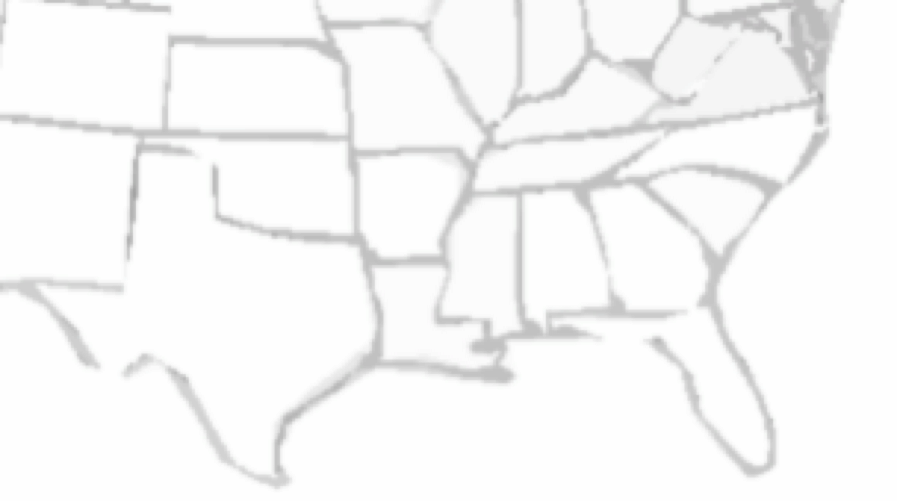Your guide to the 2016 elections in the South

The South, which holds one-third of the nation's Electoral College votes, has captured national attention in the 2016 presidential election, with Florida and North Carolina emerging as must-win battlegrounds.
While the race for the White House grips pundit attention, across the South there are races and issues on the ballot that will help influence the political direction of the fast-changing region.
The following are a few of the key state-level elections and ballot measures to watch in 2016:
North Carolina and West Virginia governors
Democrats currently hold only three out of 13 governors' mansions in the South. In 2016, they aim to make it four.
In North Carolina, where Republicans have enjoyed a state government trifecta since 2013, incumbent Gov. Pat McCrory (R) had been sinking in the polls behind Democratic challenger Roy Cooper, the attorney general. But after being dogged by fallout from the controversial House Bill 2 and his ties to Big Energy, McCrory has gained ground. Spending in the race by the candidates and outside groups has reached a staggering $27 million. This is viewed as a critical pickup for Democrats, who are hoping the race will benefit from the Clinton campaign's extensive ground game in the state.
Presidential coattails may work in the opposite direction in West Virginia, where term-limited Democrat Earl Ray Tombin is leaving an open seat. Democrat Jim Justice, a coal executive and reportedly the richest man in the state, had opened a lead over Republican Bill Cole, president of the West Virginia Senate. But Justice has been hammered over reports that he owes millions in back taxes, and Cole will likely benefit from the popularity of Donald Trump, who leads by more than 20 points in polls in the state. The gubernatorial race has drawn about $5 million in spending so far.
North Carolina and West Virginia attorneys general
These races haven't gotten much media attention, but the millions of dollars spent by special interests in the contests speak to their importance.
In North Carolina, Democrat Josh Stein, a staunch progressive, has turned the attorney general race into a referendum on HB2, a bill that his Republican opponent, state Sen. Buck Newton, helped sponsor. The the price tag for the race has crossed $4 million, including big spending from outside groups.
In West Virginia, incumbent Republican Attorney General Patrick Morrisey is facing a formidable challenge from Democrat Doug Reynolds, a former legislator and assistant prosecutor. The race will end up costing more than $10 million, with the Republican Attorneys General Association reportedly spending $7 million to benefit Morrisey and Reynolds having already personally invested more than $3 million in the campaign.
Louisiana and North Carolina supreme courts
In Louisiana, one of the two elections for the seven-member state Supreme Court features an unopposed incumbent. But the other is a surprisingly hard-fought race between two Republicans: Marilyn Castle, a state district court judge, and James Genovese, a state appeals court judge.
Energy politics is central to the contest. Castle is the choice of energy and gas interests, while groups challenging the energy industry's impact on coastal erosion, like Restore Our Coast PAC, back Genovese.
And yes, North Carolina comes up again. (There's a reason it's the top battleground of 2016.) The N.C. Supreme Court, while officially nonpartisan, has a 4-3 Republican majority. That could change if incumbent Bob Edmunds, a registered Republican, is unseated by Mike Morgan, an African-American superior court judge. More than $2 million has already been spent by outside groups in the race, with more on the way.
Kentucky House
As it stands, the Kentucky House is the only chamber in the South under the control of Democrats. But their 53-47 majority is in danger.
As in West Virginia, the GOP is hoping voters flocking to cast ballots for Trump will also help push close House races into the Republican column. About $1 million has been spent so far on the House contests, and lurid attack ads have multiplied in the final days.
Going into Election Day, one observer says the fate of the Kentucky House "is about as settled as a naked butt on a hot stove."
State ballot initiatives and amendments
As reported earlier in Facing South, voters in seven Southern states are considering a total of 38 ballot measures this year. Three of those were voted on earlier in the year, including North Carolina's $2 billion bond measure. Alabama alone will consider 14 constitutional amendments.
Other key Southern ballots initiatives and amendments to watch in 2016: widely-anticipated medical marijuana measures in Arkansas (Issue 6 and Issue 7) and Florida (Amendment 2); Florida's industry-backed Amendment 1, which is opposed by environmental groups for consolidating utility control of solar energy; efforts to enshrine anti-union "right to work" laws in the constitutions of Alabama and Virginia; and Georgia's Amendment 1, opposed by public school advocates for allowing the state to seize "failing" schools and close them, run them, or — most controversially — convert them to charters.
Tags
Chris Kromm
Chris Kromm is executive director of the Institute for Southern Studies and publisher of the Institute's online magazine, Facing South.
